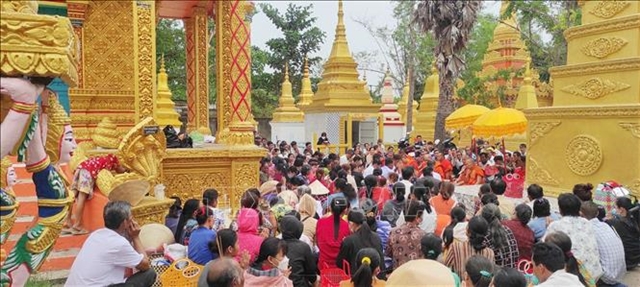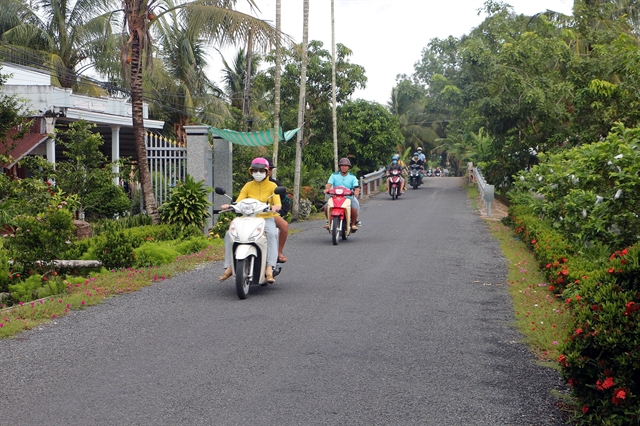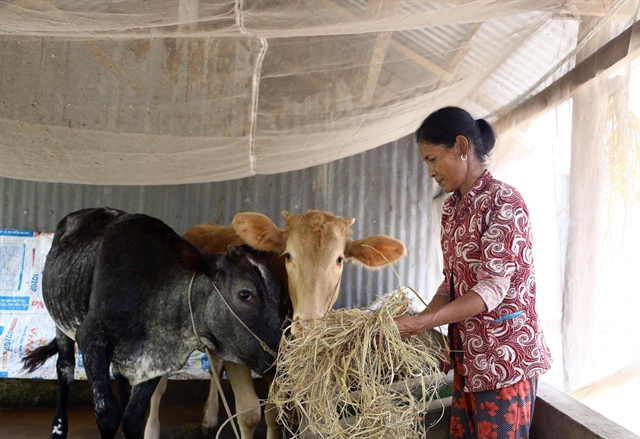 Society
Society

 |
| Ethnic Khmer people gather to celebrate Chôl Chnăm Thmây, their traditional New Year festival in the Mekong Delta region. VNA/VNS Photos |
The lives of ethnic Khmer people living in the Mekong Delta region have improved significantly in recent years as authorities have invested in infrastructure and livelihoods in their areas.
The Mekong Delta is the home of about 1.3 million Khmer ethnics, or 6.7 per cent of the delta's population.
More than 85 per cent of Khmer people make their living through farming, while the rest sell goods or work as hired labour.
The local authorities have implemented programmes to provide farming and housing land, clean water, and electricity for Khmer communities, in line with the national programme for socio-economic development in ethnic minority and mountainous areas for 2021-25.
These programmes have significantly improved the lives of the Khmer people, with up to 98 per cent of them now having stable lives.
Some 97 per cent of the 220 communes with a significant Khmer population in the delta now have roads accessible by motor vehicles, and 90 per cent of the Khmers have health insurance.
 |
| Investment has been poured into rural traffic in the Khmer ethnic area in Sóc Trăng Province's Ngã Năm Town. |
Over the past five years several Khmer pagodas have been repaired and upgraded.
In the Mekong Delta, all ethnic communes have secondary schools, health clinics and roads to the commune centres; 100 per cent of communes, wards, towns, and hamlets have electricity from the national grid; 99.6 per cent of rural households use clean water. Localities have programmes and projects to preserve and promote the value of Khmer traditional arts and culture, gradually utilising them as tourism products.
Ethnic Khmer communities in Sóc Trăng account for over 30 per cent of the province's population. The province is always interested in implementing the state's policies on investment in production development and agricultural and rural economic restructuring, according to Văn Lưu Xem, deputy chairman of the Sóc Trăng Province Fatherland Front Committee.
Ký Hiếu Thanh, deputy head of the Hậu Giang Province's Ethnic Minority Affairs Committee, said that after five years of carrying out policies for socio-economic development in ethnic minority areas, rural areas where the Khmers live had significantly improved.
He pointed out that infrastructure for socio-economic development continued to receive investment, and basic services were readily available for the locals.
The Khmer people had developed effective farming models for chicken and cattle.
 |
| Khmer ethnic people in Sóc Trăng Province are supported with soft loans to raise cattle, gradually rising out of poverty. |
Vị Thanh City’s Vị Tân Commune, Hamlet 7 has 113 Khmer households with 547 members. Many of them have been assisted through support programmes for house construction, and provided soft loans to do agriculture.
The lives of Khmer people in Bạc Liêu Province have improved significantly in recent years as authorities invested in infrastructure and livelihoods in their areas.
Danh Văn Sanh, a local Khmer farmer, said his commune’s appearance looked much better after 10 years of implementing the national new-style rural programme. Many concrete roads were built to connect all hamlets and facilitate car travel to every corner of the commune.
Many Khmers are rebuilding their houses and making rural roads more beautiful, green and clean by growing trees along them.
In Giá Rai Town, many had contributed their own land and labour to building and upgrading roads and bridges. All Khmer hamlets were accessible by roads, enabling the easy movement of people and goods, Sanh said.
The Khmer farmers were growing high-value crops to increase their incomes.
The province implemented various socio-economic programmes to improve the living conditions of the ethnic group, he said.
Besides improving the lives of the Khmer people, provincial authorities have also paid attention to preserving and promoting the diversity of their traditional culture.
Most Khmer people reside in the Mekong Delta provinces of Trà Vinh, Sóc Trăng, Kiên Giang, An Giang, Bạc Liêu, Vĩnh Long, and Cần Thơ City. VNS




